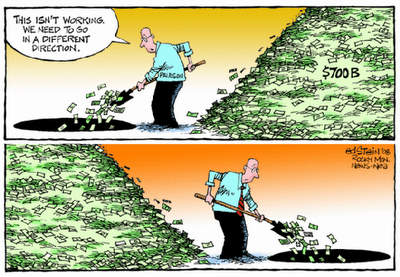The end of the US Dollar as we know it.

The New York Times published an interesting overview of the programs the US government is financing to support the struggling economy.
Beyond the $700 billion bailout known as TARP, which has been used to prop up banks and car companies, the government has made commitments of $9.9 trillion. $9.9 t-r-i-l-l-i-o-n. (If you want to have an idea what one trillion dollars looks like, check here this post).
- The Government as Investor: $5.4 trillion
Includes direct investments in financial institutions, purchases of high-grade corporate debt and purchases of mortgage-backed securities issued by Fannie Mae, Freddie Mac and Ginnie Mae.- The Government as Lender: $2.3 trillion
A significant expansion of the government's traditional overnight lending to banks, including extending terms to as many as 90 days and allowing borrowing by other financial institutions.- The Government as Insurer: $2.1 trillion
Includes insuring debt issued by financial institutions and guaranteeing poorly performing assets owned by banks and Fannie Mae and Freddie Mac.(Full)
There seems no end to the money pit left after 8 years of mismanagement in the US. So no wonder that a UN panel recommends the world to ditch the US dollar as its reserve currency in favor of a shared basket of currencies.
The proposal is to create something like the old Ecu, or European currency unit: a hard-traded, weighted basket. (Full)
My suggestion is to ditch the US dollar not only as a world reserve currency, but also as the main currency used within the UN system, where all the accounting is done in the greenback.
Cartoon courtesy Analytical Wealth
 Peter. Flemish, European, aid worker, expeditioner, sailor, traveller, husband, father, friend, nutcase. Not necessarily in that order.
Peter. Flemish, European, aid worker, expeditioner, sailor, traveller, husband, father, friend, nutcase. Not necessarily in that order.
1 comments:
As they teach in Eco 101, the value of the dollar (or any other currency, for that matter) is determined by supply and demand. Today, with the world financial markets swimming in dollars because the Federal Reserve created tons of them to forestall deflation after the panic in 2008, the central bank has been making noises about taking some of these dollars back as soon as it thinks that the economy has regained its sea legs.
Post a Comment